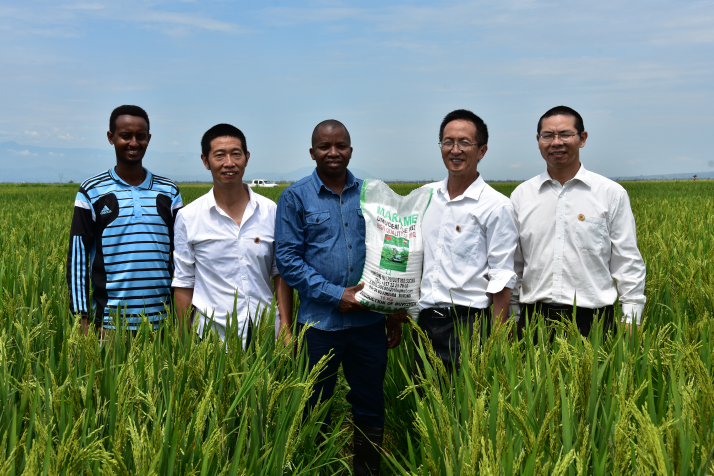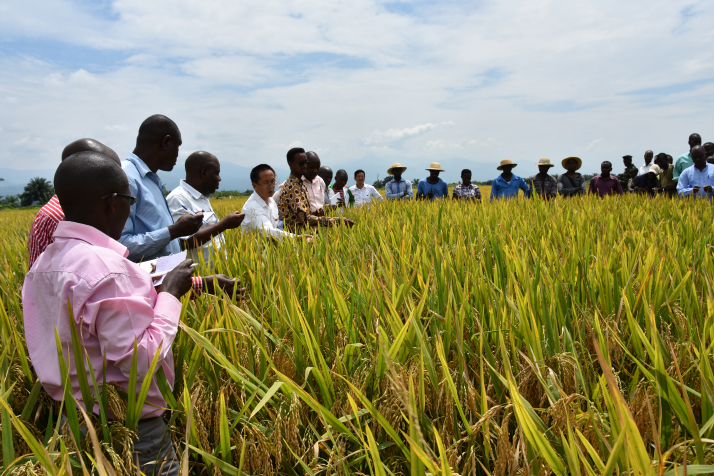|
||||||||||
| Home Nation World Business Opinion Lifestyle ChinAfrica Multimedia Columnists Documents Special Reports |
|
||||||||||
| Home Nation World Business Opinion Lifestyle ChinAfrica Multimedia Columnists Documents Special Reports |
| Agro-cooperation |
| A Sino-Burundian agricultural cooperation project helps boost local rice yields |
| Sino-Burundian agricultural cooperation will help reduce poverty |
| By Li Jing VOL.12 July ·2020-07-14 |

Rucak Umugufi used to be a pastor, but now has added a new skill to his resume: an expert in rice growing. That was possible thanks to a Sino-Burundian cooperation project in the village of Linga 4 in Gihanga County of Bubanza Province, Burundi. The rice planted by Umugufi has yields of up to 10 tons per hectare, bringing him a net income exceeding $4,000 in one season.
"Under the technical guidance of Chinese agricultural experts, rice yield has increased considerably. I want to share these technologies with more villagers and allow everyone to get rich together," Umugufi told Yang Huade, the head of the fourth Chinese agricultural mission to Burundi. Two years after its launch, this rice-growing project put in place by the group of Chinese experts was successfully completed in March 2020.
Nevertheless, Yang, an expert in rice-growing technology, and Hu Shuangquan, an expert in the processing of farm products, have remained in Burundi to provide technical follow-up support for the project, even after the successful completion of their tenure.
"The crops planted in local projects are growing and still require technical control. If we miss this opportunity, it will take an additional year to resolve some issues," Yang told ChinAfrica. "We are staying in Burundi not to guard the site, but to solve problems related to research, demonstration and production, in order to bring development to the Burundian people, and to guarantee the results of the whole project."
Aged 56, Yang has spent 37 years researching different aspects of rice-growing technology. As an agricultural expert, he has a special bond with Africa, having worked in agricultural cooperation projects in Mozambique and Burundi prior to the current mission. "I hope to use my expertise to bring benefits to Africans, help them solve their food problems, while also achieving my personal fulfillment."
As an expert in the processing of farm products, Hu is mainly responsible for conducting research and organizing demonstrations linked to the processing and storage of agricultural produce, especially rice. "In Burundi, we offer technical demonstrations and training covering the entire rice-growing process according to our respective area of research." Hu also has extensive experience in Sino-African agricultural cooperation. At the age of 49, he has traveled to many African countries, including Nigeria, Zambia, Zimbabwe and Burundi, where he carried out technical agricultural exchanges.

Compelling results
Composed of nine members, the fourth Chinese agricultural cooperation mission arrived in Burundi on March 13, 2018, for a period of two years. Their priority and main objective was to increase rice production there. Rice is one of the staple foods for the local population, but due to low yields, Burundi still has to import rice to meet domestic consumption.
After investigations, the Chinese experts found that Burundi enjoys significant sunshine, with an average temperature of 17 to 23 degrees Celsius and a large temperature difference between day and night. The country also has abundant water resources. Moreover, it is located in an ideal climatic zone for growing high-yielding rice of good quality. However, it has been difficult to realize the country's agricultural development potential, mostly due to the lack of technology, absence of high-quality varieties of rice and scarcity of water conservation facilities.
To address these problems, the seven agricultural experts worked together to significantly increase rice production in Burundi. The group introduced 16 new varieties of rice based on Chinese experience and demonstrations projects conducted in local fields. A 600-hectare hybrid rice demonstration area was created, and the Chuanxiangyou 506 hybrid rice was officially approved as the national variety of Burundi in 2018.
"With the help of this hybrid rice demonstration project, the average yield of rice crops in the plain multiplied by 2.36, and farming income by 5.4." Yang said the demonstration project in the mountains also achieved similar results, with yields increasing from 2 tons per hectare to over 7.5 tons. In addition, the experts drafted 37 regulations and technical opinions to solve several problems, including low productivity, poor crop quality, irregular cultivation and low levels of fertilization.
According to Tong Yu'e, Director of the Centre of International Cooperation Service of China's Ministry of Agriculture and Rural Affairs, the demonstration area covers more than 100 villages in nine provinces of Burundi. Sino-Burundian agricultural cooperation will help reduce poverty in the next five or six years, she noted.
In recognition of the many exceptional achievements of the Chinese experts, Burundi's Ministry of Environment, Agriculture and Livestock has awarded them a number of prizes. "You have worked miracles and given us hope. We want to promote your techniques nationwide," Minister Déo Guide Rurema told the Chinese experts at an awards ceremony.
Based on the field surveys conducted by the expert group, China has supplied 74 sets of agricultural machinery to Burundi, including wheeled tractors, manual skinning machines and rice threshers, to further improve the country's agricultural productivity.
A field of hope
"Technical training is the key to sustainable development in agriculture," Yang said. He revealed that the fourth Chinese mission has organized 37 training sessions, including theoretical learning and field demonstrations, with more than 2,400 local participants.
"I learned from Chinese experts various techniques such as how to sow crops, how to conserve water in the field and how to achieve scientific fertilization, which greatly increased the yield of rice and improved the living conditions of my family," said Irankunda Ernist, who has attended several training courses given by Chinese experts since 2018.
Ernist is now in charge of a 90-hectare demonstration site in the Cibitoke Province, which has yields of up to 7.5 tons of rice per hectare. "Local technicians and farmers often visit our site to learn new techniques. In this way, we hope to assist more people by bringing them advanced rice-growing techniques," said Yang.
Despite the many compelling achievements, there are still some serious problems to be dealt with in the short term. "In future agricultural cooperation, we will have to further strengthen technical training and make good use of the demonstration bases, in order to guarantee the sustainability of the project and bring even more benefits to the local population," Hu said.
Yang and Hu are still working in Burundi to ensure the orderly implementation of various agricultural projects. And they will continue to work in this promising land as members of the fifth agricultural cooperation mission from China. CA
(Print Edition Title: Guardians of Rice Fields)
Comments to lijing@chinafrica.cn
| About Us | Contact Us | Advertise with Us | Subscribe |
| Copyright Beijing Review All rights reserved 京ICP备08005356号-5 京公网安备110102005860号 |